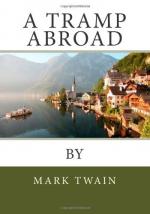I said:
“You have done well, Harris; this report is concise, compact, well expressed; the language is crisp, the descriptions are vivid and not needlessly elaborated; your report goes straight to the point, attends strictly to business, and doesn’t fool around. It is in many ways an excellent document. But it has a fault—it is too learned, it is much too learned. What is ‘DINGBLATTER’?
“‘DINGBLATTER’ is a Fiji word meaning ‘degrees.’”
“You knew the English of it, then?”
“Oh, yes.”
“What is ‘GNILLIC’?
“That is the Eskimo term for ‘snow.’”
“So you knew the English for that, too?”
“Why, certainly.”
“What does ‘MMBGLX’ stand for?”
“That is Zulu for ‘pedestrian.’”
“’While the form of the Wellhorn looking down upon it completes the enchanting BOPPLE.’ What is ’BOPPLE’?”
“‘Picture.’ It’s Choctaw.”
“What is ’SCHNAWP’?”
“‘Valley.’ That is Choctaw, also.”
“What is ’BOLWOGGOLY’?”
“That is Chinese for ‘hill.’”
“’KAHKAHPONEEKA’?”
“‘Ascent.’ Choctaw.”
“‘But we were again overtaken by bad HOGGLEBUMGULLUP.’ What does ‘HOGGLEBUMGULLUP’ mean?”
“That is Chinese for ‘weather.’”
“Is ‘HOGGLEBUMGULLUP’ better than the English word? Is it any more descriptive?”
“No, it means just the same.”
“And ‘DINGBLATTER’ and ‘GNILLIC,’ and ‘BOPPLE,’ and ’SCHNAWP’—are they better than the English words?”
“No, they mean just what the English ones do.”
“Then why do you use them? Why have you used all this Chinese and Choctaw and Zulu rubbish?”
“Because I didn’t know any French but two or three words, and I didn’t know any Latin or Greek at all.”
“That is nothing. Why should you want to use foreign words, anyhow?”
“They adorn my page. They all do it.”
“Who is ’all’?”
“Everybody. Everybody that writes elegantly. Anybody has a right to that wants to.”




